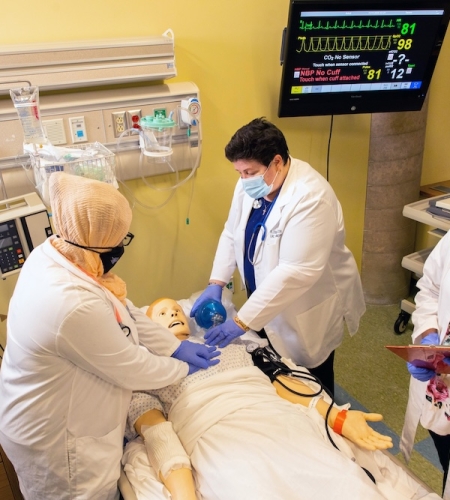
Emergency Medical Services and Leadership, B.S.
The program is designed to provide advanced knowledge, practical skills, and leadership training to prepare graduates for leadership roles in emergency medical services and healthcare management. The program integrates clinical expertise, operational knowledge, and leadership principles to cultivate well-rounded healthcare professionals who can effectively manage teams, improve systems, and provide high-quality patient care.
About Emergency Medical Services and Leadership
According to the U.S. Bureau of Labor and Statistics, the demand for Emergency Medical Services (EMS) professionals is projected to grow significantly. Projections show the employment for Emergency Medical Technicians (EMTs) and paramedics is expected to grow 7% from 2021 to 2031, faster than the average for all occupations. This expected growth is driven by an aging population and increasing medical emergencies, the need for advanced pre-hospital care, and the expansion of EMS roles in the community health and disaster management community.
There is currently a surge in leadership roles in the varying aspects of emergency medical services and the healthcare community. Many EMS organizations require skilled leaders to manage complex operations, coordinate with healthcare systems, and adapt to evolving challenges in healthcare and changes in disaster management in the community.
The demand for professionals holding a Bachelor of Science in Emergency Medical Services (EMS) and Leadership is influenced by several factors, including the evolving healthcare landscape, the increasing complexity of emergency medical care, and the need for skilled leadership within EMS organizations. Forward-thinking Leadership training in EMS is critical for improving system efficiency, patient outcomes, and workforce retention in the pre-hospital and hospital systems.
Program Details
The Emergency Medical Services and Leadership program is designed to equip students with the advanced clinical knowledge, strategic leadership skills, and operational expertise necessary for impactful careers in the dynamic field of emergency medicine. This comprehensive program prepares graduates not only for traditional roles as emergency medical technicians (EMTs) or paramedics but also for specialized leadership positions that extend beyond frontline clinical care. Students engage in an interdisciplinary curriculum that blends evidence-based clinical training with coursework in healthcare management, organizational leadership, quality improvement, and systems coordination.
Emphasizing both practical and theoretical learning, the program develops professionals who are capable of leading emergency response teams, overseeing EMS operations, implementing policy and protocol improvements, and navigating complex healthcare environments. Graduates emerge as competent, ethical, and visionary leaders who are prepared to drive innovation, enhance patient outcomes, and contribute meaningfully to the evolving landscape of emergency medical services and healthcare leadership.
Career Paths
Clinical & Field Roles
- Paramedic Supervisor / Field Training Officer – Oversees EMS crews and ensures protocol compliance
- Tactical Medic – Works with SWAT or law enforcement in high-risk scenarios
- Flight Paramedic – Provides care in air ambulances; often requires additional certifications
- Community Paramedic – Works in preventive care, often in underserved communities
Leadership & Administrative Roles
- EMS Director / Operations Manager – Manages entire EMS departments or private ambulance services
- Emergency Management Coordinator – Plans and directs disaster response or crisis management activities
- Hospital EMS Liaison – Coordinates between EMS and hospital emergency departments
- Clinical Quality Improvement Officer – Oversees patient care data, implements quality assurance measures
Education & Training
- EMS Educator / Program Director – Teaches at community colleges or technical schools; may oversee EMT/Paramedic training programs
- Simulation Lab Coordinator – Manages emergency medical simulations in healthcare or academic settings
Related Healthcare Careers
- Healthcare Administrator (with experience) – Works in health systems, focusing on emergency or trauma services
- Safety Officer / Risk Manager – Ensures safety protocols are met in healthcare or industrial settings
Public Sector / Policy
- Public Health Preparedness Coordinator – Works in local or state health departments preparing for public health emergencies
- Fire Department Officer (with dual certification) – Many officers in fire services have EMS backgrounds and degrees
Graduate Education Pathways

Master of Science in Emergency Management (MSEM)
- Ideal for: Disaster preparedness, crisis response, public safety leadership
- Careers: Emergency Management Director, Homeland Security Officer, Public Health Emergency Planner
- Key Courses: Risk assessment, disaster response planning, interagency coordination
Master of Public Health (MPH)
- Ideal for: Community health roles, EMS integration with public health, epidemiology
- Careers: Public Health Preparedness Coordinator, Community Paramedicine Program Manager
- Key Courses: Health policy, biostatistics, epidemiology, environmental health
Master of Healthcare Administration (MHA)
- Ideal for: Leadership in hospitals, EMS systems, or healthcare networks
- Careers: Hospital EMS Liaison, EMS Director, Operations Manager
- Key Courses: Health economics, quality improvement, organizational behavior
Master of Business Administration (MBA)
Healthcare or Operations Focus
- Ideal for: Strategic leadership roles, private sector EMS, or launching your own EMS enterprise
- Careers: Executive Director of EMS, Healthcare Consultant, Entrepreneur
- Key Courses: Financial management, operations strategy, leadership ethics
Master of Science in Health Informatics or Healthcare Quality
- Ideal for: EMS data analysis, performance improvement, patient safety roles
- Careers: Clinical Quality Officer, EMS Data Analyst, Compliance Manager
- Key Courses: Health IT, quality metrics, data visualization
Master of Education (M.Ed)
Health Professions Education
- Ideal for: EMS educators, program directors, training coordinators
- Careers: EMS Instructor, Academic Program Director, Simulation Lab Manager
- Key Courses: Curriculum development, adult learning, instructional design
Physician Assistant (PA) or Nurse Practitioner (NP) Programs
- Ideal for: Clinicians looking to expand scope of practice into advanced care
- Note: Requires additional prerequisites (e.g., anatomy, biology, patient care hours)
- Careers: PA in emergency departments, critical care, or urgent care
Doctoral Options (Long-Term Paths)
Doctor of Health Administration (DHA)
Focus: High-level health system leadership
Doctor of Public Health (DrPH)
Focus: Population health leadership, policy
PhD in Emergency Management or Public Health
Focus: Academic, policy, or research career
Program Information
- Degree Awarded
-
- Bachelor of Science
- Program Type
-
- Major
- Program Location
-
- Main Campus - Northeast Philadelphia
